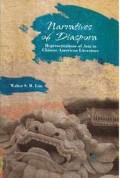Abstract
In Li-Young Lee’s writing of the Chinese diasporic experience, migration to the United States is not represented as the defining experience that brings respite after discrimination on the basis of race, political persecution, and forced transnational crossings. Consciousness of race has been forced on Lee as a subject of Chinese descent born in Indonesia, an experience encountered at uncomfortably close range by Lee in the political persecution of his father by the Indonesian government. For Lee, the father who is the patriarch of the family is not only its provider and protector but also a victim of persecution, not only the repository of values but also an estranging figure of authority. A controlling presence in Lee’s diasporic experience, this father epitomizes the emotional and psychological dislocations of exile, facilitating remembrance of Indonesia at the same time that he creates space for the possibilities of a new life in America.
Access this chapter
Tax calculation will be finalised at checkout
Purchases are for personal use only
Preview
Unable to display preview. Download preview PDF.
Notes
Li-Young Lee, The Winged Seed: A Remembrance (New York: Simon and Schuster, 1995). Subsequent references to the text are to this edition and will be cited as WS.
Bill Moyers, The Language of Life (New York: Doubleday 1995), 258.
Li-Young Lee, The City in Which I Love You (New York: BOA, 1990), 77–87. All subsequent references to the text are to this edition and will be referred to as City.
Xiaojing Zhou, “Inheritance and Invention in Li-Young Lee’s Poetry,” MELUS 21, no. 1 (Spring 1996): 113–32;
Jeffrey F. L. Partridge, “The Politics of Ethnic Authorship: Li-Young Lee, Emerson, and Whitman at the Banquet Table,” Studies in the Literary Imagination 37, no. 1 (Spring 2004): 103–26;
Partridge, Beyond Literary Chinatown (Seattle: University of Washington Press, 2007), 77–98.
Steven G. Yao, Foreign Accents: Chinese American Verse from Exclusion to Post-ethnicity (Oxford, UK: Oxford University Press, 2010), 146.
Wang Gungwu, China and the Chinese Overseas (Singapore: Eastern Universities Press, 2003), 320.
Edward W. Said, Reflections on Exile and Other Essays (Cambridge, MA: Harvard University Press, 2002), 173.
Li-Young Lee, Rose (New York: BOA, 1986), 18. All subsequent references to the text are to this edition and will be referred to as Rose.
For a study of the history of contemporary American avant-garde, one that involves Asian American poets’ experimentation with and debates about poetic forms, see Timothy Yu, Race and the Avant-Garde: Experimental and Asian American Poetry since 1965 (Stanford, CA: Stanford University Press, 2009). Yu’s study traces the development of the Asian American avant-garde by offering not only nuanced close readings of representative poems but also an account of the cultural implications of different critical readings responding to this development.
T. S. Eliot, Four Quartets (New York: Harcourt, 1968), 14.
T. S. Eliot, Selected Poems (New York: Harcourt Brace Jovanovich, 1934), 107.
Copyright information
© 2013 Walter S. H. Lim
About this chapter
Cite this chapter
Lim, W.S.H. (2013). Writing Exile and Diaspora in Li-Young Lee’s The Winged Seed and The City in Which I Love You. In: Narratives of Diaspora. Palgrave Macmillan, New York. https://doi.org/10.1057/9781137055545_5
Download citation
DOI: https://doi.org/10.1057/9781137055545_5
Publisher Name: Palgrave Macmillan, New York
Print ISBN: 978-1-349-34264-8
Online ISBN: 978-1-137-05554-5
eBook Packages: Palgrave Literature CollectionLiterature, Cultural and Media Studies (R0)

